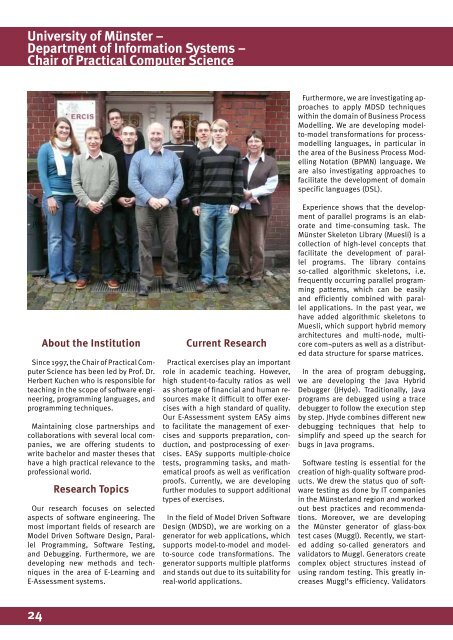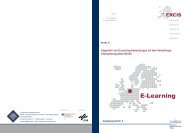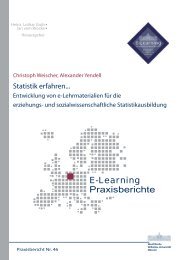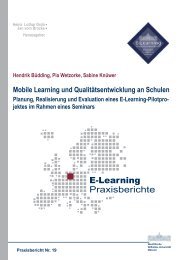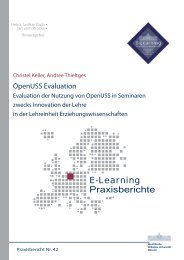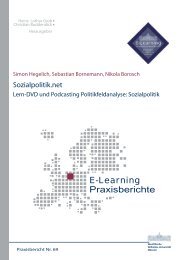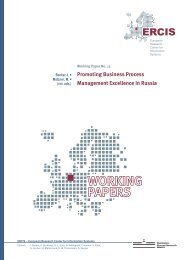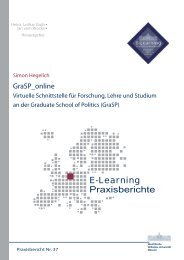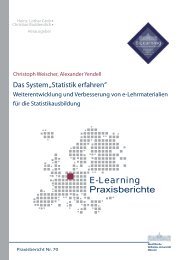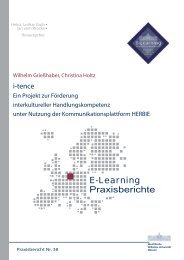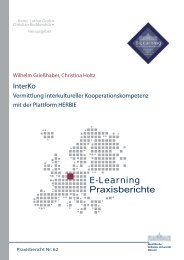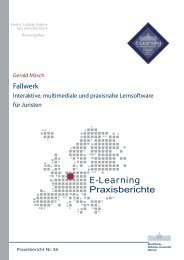2010 - ERCIS
2010 - ERCIS
2010 - ERCIS
You also want an ePaper? Increase the reach of your titles
YUMPU automatically turns print PDFs into web optimized ePapers that Google loves.
University of Münster –<br />
Department of Information Systems –<br />
Chair of Practical Computer Science<br />
24<br />
About the Institution<br />
Since 1997, the Chair of Practical Computer<br />
Science has been led by Prof. Dr.<br />
Herbert Kuchen who is responsible for<br />
teaching in the scope of software engineering,<br />
programming languages, and<br />
programming techniques.<br />
Maintaining close partnerships and<br />
collaborations with several local companies,<br />
we are offering students to<br />
write bachelor and master theses that<br />
have a high practical relevance to the<br />
professional world.<br />
Research Topics<br />
Our research focuses on selected<br />
aspects of software engineering. The<br />
most important fields of research are<br />
Model Driven Software Design, Parallel<br />
Programming, Software Testing,<br />
and Debugging. Furthermore, we are<br />
developing new methods and techniques<br />
in the area of E-Learning and<br />
E-Assessment systems.<br />
Current Research<br />
Practical exercises play an important<br />
role in academic teaching. However,<br />
high student-to-faculty ratios as well<br />
as shortage of financial and human resources<br />
make it difficult to offer exercises<br />
with a high standard of quality.<br />
Our E-Assessment system EASy aims<br />
to facilitate the management of exercises<br />
and supports preparation, conduction,<br />
and postprocessing of exercises.<br />
EASy supports multiple-choice<br />
tests, programming tasks, and mathematical<br />
proofs as well as verification<br />
proofs. Currently, we are developing<br />
further modules to support additional<br />
types of exercises.<br />
In the field of Model Driven Software<br />
Design (MDSD), we are working on a<br />
generator for web applications, which<br />
supports model-to-model and modelto-source<br />
code transformations. The<br />
generator supports multiple platforms<br />
and stands out due to its suitability for<br />
real-world applications.<br />
Furthermore, we are investigating approaches<br />
to apply MDSD techniques<br />
within the domain of Business Process<br />
Modelling. We are developing modelto-model<br />
transformations for processmodelling<br />
languages, in particular in<br />
the area of the Business Process Modelling<br />
Notation (BPMN) language. We<br />
are also investigating approaches to<br />
facilitate the development of domain<br />
specific languages (DSL).<br />
Experience shows that the development<br />
of parallel programs is an elaborate<br />
and time-consuming task. The<br />
Münster Skeleton Library (Muesli) is a<br />
collection of high-level concepts that<br />
facilitate the development of parallel<br />
programs. The library contains<br />
so-called algorithmic skeletons, i.e.<br />
frequently occurring parallel programming<br />
patterns, which can be easily<br />
and efficiently combined with parallel<br />
applications. In the past year, we<br />
have added algorithmic skeletons to<br />
Muesli, which support hybrid memory<br />
architectures and multi-node, multicore<br />
com¬puters as well as a distributed<br />
data structure for sparse matrices.<br />
In the area of program debugging,<br />
we are developing the Java Hybrid<br />
Debugger (JHyde). Traditionally, Java<br />
programs are debugged using a trace<br />
debugger to follow the execution step<br />
by step. JHyde combines different new<br />
debugging techniques that help to<br />
simplify and speed up the search for<br />
bugs in Java programs.<br />
Software testing is essential for the<br />
creation of high-quality software products.<br />
We drew the status quo of software<br />
testing as done by IT companies<br />
in the Münsterland region and worked<br />
out best practices and recommendations.<br />
Moreover, we are developing<br />
the Münster generator of glass-box<br />
test cases (Muggl). Recently, we started<br />
adding so-called generators and<br />
validators to Muggl. Generators create<br />
complex object structures instead of<br />
using random testing. This greatly increases<br />
Muggl’s efficiency. Validators


